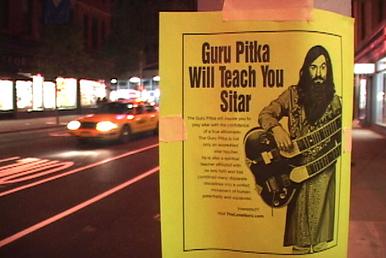If you are not native to New York, then you may not be familiar with the phrase “Dan Smith Will Teach You Guitar”, but for born and bred New Yorkers this phrase should immediately conjure a very specific image. This image to be exact:

If you’re unfamiliar, allow me to catch you up and describe why this is not only a wonderful story but in fact a tremendous lesson in marketing that can be utilized by startups and Fortune 500s alike.
In 1988, Dan Smith moved from Massachusetts to New York City with a simple goal: to teach you guitar. But how in the world would he let everyone in NYC know this? What clever marketing tactic would he use? What out-of-the-box, attention-grabbing device would he employ? How about flyers that simply state “Dan Smith Will Teach You Guitar” posted on every corner of New York City? Perfect.
The simplicity of the message does invite parody. But the simplicity of the message is everything. There’s no hook. There’s no trick. There’s no device. It’s just honest.
In marketing, we talk a lot about how adept consumers are at sniffing out BS. But so often, in our acknowledgement, it feels like we’re trying to figure out our way to slide through the BS detectors, like a gentlemen spy in a room full of infrared lasers, instead of just stripping down the message and telling the most basic truth.
Also, quickly circling back on the point of inviting parody, it’s worth noting that no one has ever parodied something that was uninteresting. Go ahead and make an ad that’s a bit too on the nose. Make an ad that’s a bit silly or basic. If it invites parody, as this ad did, then that’s fantastic. As long as the ad is honest then they aren’t just making fun of you, they are spreading awareness for free.

So here is what I’m proposing: It’s time we get back to basics. Especially, if you are a newer or smaller company with a limited marketing budget. While it may seem like a relic of marketing past, in my opinion the old way is the only way: one message, everywhere.
But we need to reach this consumer over here with this specific lower funnel message during Q2 while our priority in Q4 is these consumers whose interests vary based on blah blah blah – NO!
One message, everywhere.
Next, your ads don’t need to be emotionally manipulative. They don’t need to make people cry in order to push product.
Ah when we’ve kicked them in the gut, got them good and vulnerable, that’s when we’ll sell them Bud Light!
Oh oh, how about we show them what it truly means to grow up and learn how to love oneself – that’ll make them buy more Q-tips, no?
One message, everywhere.
Oh and finally, stop getting fancy with your ad formats just because it makes you feel creative and makes your stakeholders feel edgy. You aren’t pushing boundaries by suggesting to use VR. No one is using VR yet. It’s coming but just not in 2019. Your message is useless if no one sees it. Save money on the “cutting edge” stuff and instead maximize your reach. Even if that means putting flyers on every lamppost in the city…
One message, everywhere.
It’s time that marketing took a lesson from pop culture. Repetition is the most important factor for branding. It’s the only thing that matters. It’s why the most popular songs have the fewest words and just repeat the same phrase over and over again. It’s why the most recognizable celebrities, like Cardi B and DJ Khaled, have catch phrases. Okurrrrrr.
Even this post utilized repetition. You probably won’t remember most of what I wrote but you will remember the 3 bolded words that I flooded throughout this whole piece. Speaking of which, it’s probably about time to post another one. I mean, Anotha One.
One message, everywhere.
Dan Smith set out to do one thing in life – teach you guitar. And while I’m sure he taught many people guitar, he taught more people marketing.



